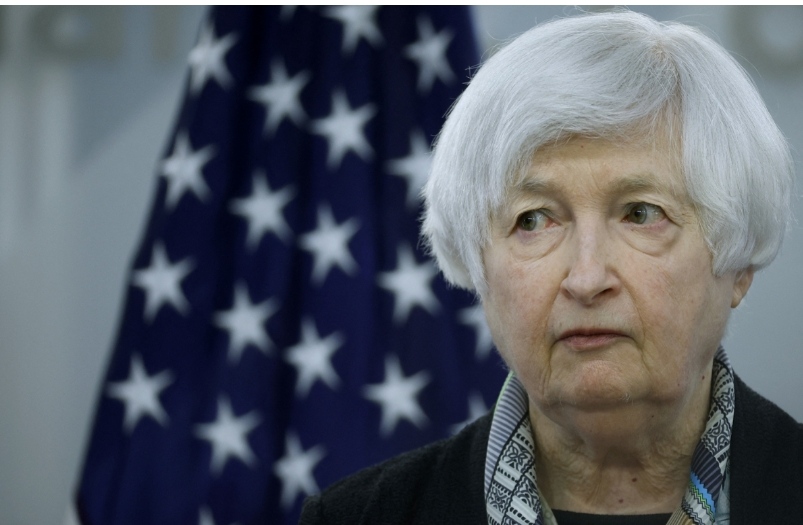Voices grow stronger in US for China tariff cuts as inflation ‘singes US eyebrows’

US Treasury Secretary Janet Yellen
US Treasury Secretary Janet Yellen on Wednesday confirmed she is pushing for the Biden administration to roll back some China tariffs in her at least fifth public appeal against additional tariffs on Chinese goods since the former Federal Reserve chair was sworn in as the first woman to head the US Treasury.
As the sizzling inflation ravages the US economy and roils US capital markets, voices are growing within the Biden administration and across the US to lift China tariffs that have led to self-harm for Washington.
The more articulate disapproval of groundless punitive tariffs on Chinese items versus the continued stubbornness of some conservatives who favor tariffs as leverage against China points to a deepening crisis confronting the US government, market watchers said Thursday.
A possible move to break the impasse that has fanned US inflation, as one veteran Chinese observer suggested, could be a proposal by Yellen to rethink unjustified Chinese-targeted sanctions imposed by her department. Such a gesture of good will would see China follow suit as it benefits both countries and the world, the observer said.
Louder call
Yellen on Wednesday advocated for lifting some tariffs on Chinese goods that “aren’t very strategic” but are instead hurting US consumers and businesses, media reports said.
Internal talks are underway about punitive “Section 301” tariffs imposed under the former Donald Trump administration on hundreds of billions of dollars of Chinese products, Yellen told a press conference ahead of a meeting of G7 finance ministers and central bankers.
When asked about Yellen’s call to cut tariffs, Shu Jueting, spokesperson of the Ministry of Commerce, reiterated on Thursday that the US removing additional tariffs on China amid high inflation is in line with the fundamental interests of US consumers, businesses, and would be beneficial for the US, China and the world.
The annual inflation rate in the US edged down to 8.3 percent in April, from March’s 41-year high of 8.5 percent. The inflation reading still overshot an estimated rate of 8.1 percent, sowing seeds of anxiety over the US economy.
The pain caused by inflation is a taste of the US’ own medicine since the Trump administration moved recklessly to launch a tariff war against China, said Dong Shaopeng, an expert advisor for the China Securities Regulatory Commission.
The Biden administration has also failed to rescind the groundless tariffs at the earliest possible time. Accordingly, Chinese supplies to the US have been affected, a damaging consequence worsened by disruptions to supply chains caused by the COVID-19 pandemic, Dong remarked.
As the US begins a review of its tariffs on Chinese goods ahead of their July expiration, calls are growing for the US to roll back Trump-era China tariffs.
The Wednesday remarks were at least Yellen’s fifth call for a reconsideration of China tariffs since she assumed the role of Treasury Secretary under Biden in January 2021.
In an interview on Bloomberg Television in late April, Yellen signaled openness to rolling back the Trump-era tariffs on Chinese imports to provide Americans relief from runaway inflation.
Late last year, Yellen said lower tariffs on Chinese goods could help ease some inflationary pressures, while addressing Reuters Next, a virtual global conference.
She made similar remarks in an interview with Reuters that criticized tariffs for tending to boost domestic prices while raising costs for consumers and firms, meaning that scaling back tariffs would have a disinflationary effect, Reuters said in an article dated November 1, 2021.
“Tariffs are taxes on consumers. In some cases it seems to me that we did hurt American consumers,” Yellen said in an interview with The New York Times in July 2021.
While Yellen is emerging as one of the lead advocates within the Biden administration for a rollback of China tariffs, she’s not the only one, with a growing number of like-minded people putting increasing pressure on the Biden administration to waive tariffs on Chinese items to combat the dangers of inflation.
The US could lower tariffs on “a host of non-strategic Chinese goods such as bicycles or apparel to help combat inflation,” Reuters reported in April, citing Deputy National Security Adviser Daleep Singh.
Intolerable inflation has also prompted US businesses to lobby against additional tariffs on Chinese goods.
The National Retail Federation (NRF), which represents thousands of retailers in the US including Walmart and Target, on Wednesday urged Biden to lower or lift tariffs on Chinese imports.
“Removing the harmful China 301 tariff will alleviate some of the inflationary pressure on the US economy,” NRF President Matthew Shay wrote in a letter to Biden.
The retailers’ group claimed that lifting Trump-era tariffs could lower consumer prices by as much as 1.3 percent.
The removal of additional tariffs on Chinese products could lower US consumer inflation by 1.5 percentage points from the current level. It is expected that labor-intensive products to initially make it onto a list of items to be exempted from the additional tariffs.
Infighting and stock rout
While Yellen has emerged as a clear voice of support among Biden’s aides for tariff cuts, she has yet to get an overwhelming edge over those planning to hold off any slashes, in a sign of a bitter divide in the White House, said experts who were downbeat about the US market amid prolonged infighting.
Inflation supposedly falls under the purview of the Fed and the Treasury Department, motivating the two agencies to clamor for efforts to fight inflation, while the Office of the United States Trade Representative (USTR) is not in a position to worry about inflation.
The different policy priorities result in varying departmental stances on tariffs, the expert said. The conspicuous divide within Biden’s cabinet that has seen “Yellen seemingly overstepping her role” to urge her peers to cut tariffs is proof that “inflation is singeing US eyebrows.”
Yellen and USTR Katherine Tai are at odds over whether to cut many of the additional tariffs on China, Reuters reported on Tuesday.
While the reduction or cancellation of China tariffs remains a war of words, what Yellen could do in an attempt to break the impasse is reconsidering some of the sanctions the Treasury Department has announced against China.
The Biden administration’s tariff decision would be crucial to US capital markets, which have been reeling from engulfing inflation, market watchers said.
The Fed’s drastic rate-hike path is not sufficiently compelling to stave off inflation, Gao said, adding that the increased cost of financing as a result of rate hikes would, more worryingly, slam its capital markets, which make a massive contribution to US family and business assets.
A massive correction of around 30 percent seems inevitable for US stocks in the foreseeable future. US stocks have plunged recently amid mounting investor fears over inflation that erodes company earnings and consumer demand, said Yang Delong, chief economist at Shenzhen-based First Seafront Fund Management Co.
The Dow Jones Industrial Average plummeted 1,164.52 points, or 3.57 percent, on Wednesday in its worst day since June 2020. The S&P 500 lost 4.04 percent while the NASDAQ was routed 4.73 percent.
The continued losses in US stocks that have frustrated some investors betting on a rapid rebound have also been attributed to US share valuations that remain at their highest after more than a decade of an upward spiral, analysts said.
With the NASDAQ and S&P 500 falling into bearish territory, namely having lost more than 20 percent from their recent highs, a selloff across US stocks is shown to be deepening, Yang said, forecasting a continuation of the downtrend.




